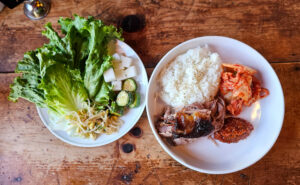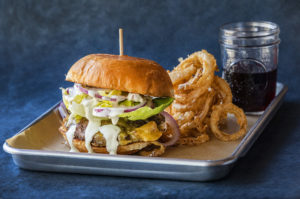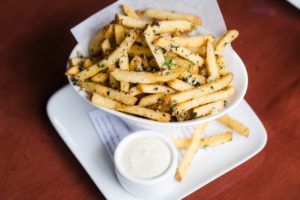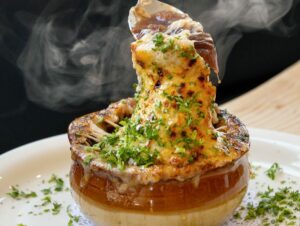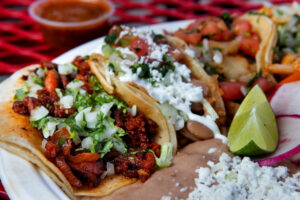
Lying around in full couch tuber regalia, following the heartbreakingly tantalizing 49er game, I had the misfortune to channel-surf through the treacherous waters of Monday Night Television, only to find my mental Minnow festooned around the awful coral head of Adam Richman’s Man v. Food. As if driving past an overturned car in a highway ditch, or probing a sore inside a cheek, I sat there, glassy-eyed and I must suppose mildly brain-damaged, for perhaps 15 minutes (an amount of time that, at roughly 0.00003% of my expected life span, strikes me as too long by at least half), transfixed, seemingly incapable of averting attention from either Mr. Richman’s ham-handed narrative or the grotesque display of gustatory abuse which forms the dubious premise of the show.
This particular car-wreck happened to be an episode in Philadelphia, in which the host must face down a single, titanic cheese steak from Tony Luke’s, the sandwich in question (although to call it that is surely to insult the Earl’s good memory and proper sandwiches everywhere) weighing in at an appalling 5lbs in total, and constructed from 3lbs of meat, 1lb of American cheese, and a half-pound of fried onions, all stuffed into a 20″-long sub roll, which I suppose we’re meant to infer weighs another half-pound. This is not the foul pile of landfill masquerading as food and pictured above-right; that unfortunate distinction belongs to Parker’s Hot Dogs in Sacramento, home to yet another 5lbs of televised obscenity at the hands of said Mr Richman. But even to debate the particulars is to offer the offer the show far more quarter than it deserves; the what he eats is irrelevant in comparison to the why.
I’ve been puzzling over what bothers me so much about the show for the last couple of days: Notwithstanding the puppy-dog eyes and smarmy winks, Mr Richman himself seems inoffensive enough, and arguably knows what he’s doing, both in front of the camera (he studied drama at Yale) and in the kitchen (he claims to be a trained sushi chef); nor is it the quality of the food itself, as he generally chooses destinations of some culinary merit (I have nothing against his roadie-food strong suit of cheese steaks, chili dogs, and burgers), or at least so they seem prior to his blasphemous display of eating whatever it is that they make. No, I think the problem lies with the premise of the show itself, the very idea that eating – to me, an inherently pleasurable, and literally life-giving, enterprise – should be reduced to a contest between the eater and the stuff on the plate
The great writer and patron saint of food bloggers everywhere, Mary Frances Kennedy Fisher, once said that the “enjoyment of the art of living, as well as of eating… are, or can be, synonymous.” Man v. Food is predicated on nothing less than the complete moral inversion of Ms Fisher’s guiding principle – the title itself proclaims mouth and fork to be enemies – and I’m guessing that that is what chafes me like a dull razor. Food is (or at least should be) enormously enjoyable and, served in proportion to its purpose, satisfies one of the most basic conditions for life; the absence of food implies hunger and death (the millions so afflicted are a tragedy of global proportions and a blight on our collective social conscience), and food in excess implies death by means other than hunger, but death just the same (we are a nation of over-eaters, on this the data is incontrovertible). And yet here is a major television production that exists solely by virtue of our ability to transform good food into something dangerously unpleasant. Worse still, this transformation is effected by the application of quantity: What would otherwise be nourishing, or at least tasty (I’m not sure if even the finest chili dog could ever be called ‘nourishing’), becomes a threat, simply because of the sheer size of the serving.
I know, I get it, it’s all just entertainment, you don’t need to post a reply with a litany of even-worse sins; we can just stipulate that competitive eating likely fails to represent one of the clear and present dangers to civilization as we know it, and that there are any number of significantly more disturbing examples of televised programming (certainly, The Swan and anything even peripherally related to Toddlers and Tiaras would rank higher on both lists). But its relative innocuousness in relation to graver threats in no way obviates my argument with Mr Richman and his self-destructive quest for ad revenue: The fact remains that the Travel Channel, by aggrandizing gluttony for a nation of the epidemically obese, sells our collective good sense of what food can and should be right down the river.




